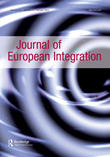The EU, External Actors, and the ‘Arabellions’: Much Ado About (Almost) Nothing
Cover: Journal of European Integration
Image Credit: Routledge
Tanja A. Börzel, Thomas Risse, Assem Dandashly – 2015
This article summarizes the findings from the special issue. The EU, the US, and to some extent Turkey are the only actors considered in this special issue who not only explicitly try to promote human rights and democracy, but also employ specific instruments and resources for this purpose. But all external actors prioritized stability and security over democracy as the events unfolded. Despite all the discussions about EU actorness, we did not find any difference between the EU, on the one hand, and the four states we looked at in this special issue (the US, Russia, Turkey, and Israel), on the other. In fact, the US arguably pursued the most incoherent and inconsistent foreign policy toward the MENA region in response to the Arabellions. Among the three explanations considered in the introduction to this special issue, realism scores worst. ‘Objective’ geostrategic interests cannot account for the variation in policy responses by the external actors. The authors in this special issue point to domestic politics in the various countries and inside the regional organization (the EU) considered here. Self-understandings and collective identities provide a complementary explanation for why external actors have acted against their economic and security goals. As to the effects of the external actors’ policies in the target countries, the main drivers of events during the Arabellions have been domestic so that external actors could only assume subsidiary roles. Tunisia might be the only case in which external democracy promotion—in this case by the EU—played an auxiliary role.

